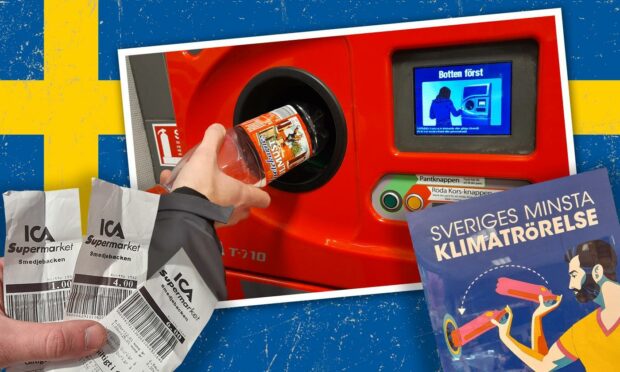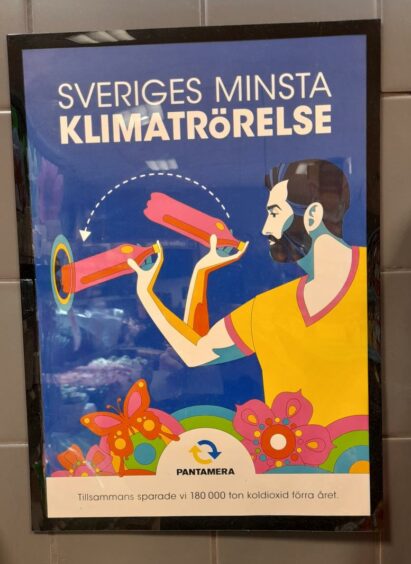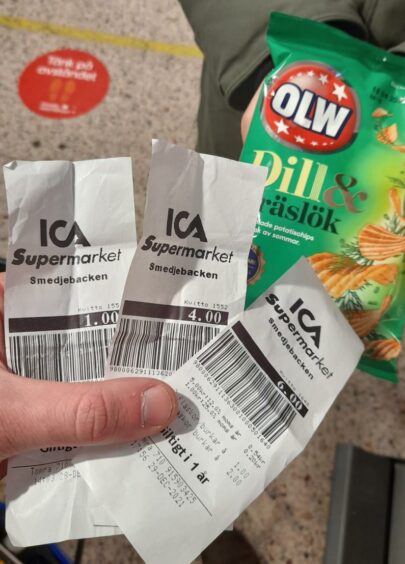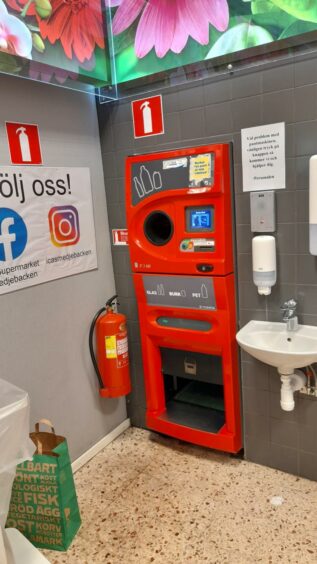When my Swedish relatives found out Scotland still doesn’t have an official return scheme for bottles and cans, they were shocked.
“That’s insane!” my sister-in-law told me at the dinner table in Smedjebacken, with a look of genuine confusion on her face as we considered all the post-Christmas empties in the kitchen.
“What happens to all your rubbish?”
Recycling your old drinks containers for cash back with reverse vending machines (RVMs) and the like has been part of daily life in Sweden since the 80s.
For generations of Swedes it has become as intrinsically part of daily life as meatballs and Ikea.
In Scotland, our deposit return scheme was due to officially start in July 2022, but that date has now been pushed back to August 2023.
So, while visiting my family in Sweden over Christmas, I decided to find out how the national Swedish bottle and can recycling system works for myself — and see what lessons Scotland can learn.
How to turn rubbish into Money, Money, Money
Plastic bottles and metal cans that have the Pant symbol on them can be taken for recycling in the around 3,100 shops in Sweden that contain official RVMs.
Special deposit points and bigger machines are also available for larger volumes of empties needing recycled, and Swedes can access an online map to find their nearest place to recycle.
Once a user is finished putting their empty containers into the system, they then get a receipt they can use for money off their purchase in the shop containing the RVM they used.
The amount of money you get back depends on how much you recycle at once.
You can also ask for the receipt to be turned into cash, so you can spend the money elsewhere.
And with the help of a smartphone app, you can also directly put the money you get from recycling into your bank account.
All containers with a Pant symbol cost a little bit extra in Sweden, and it is this extra cash that users get back through the deposit return scheme.
Transforming litter into pocket money and beer: How Swedes take advantage of the scheme
During my visit to Smedjebacken, I asked my Swedish relatives about their experiences living and growing up with RVMs in almost every shop.
My brother-in-law explained that his workplace collects empty cans and bottles throughout the year, and when Christmas comes around, they recycle them all at once to get a cash boost for a group night out.
And when my wife and sister were young, they were incentivised to pick up litter with a Pant symbol on it in order to get some free pocket money for sweeties — satisfying their sweet tooth and cleaning up their communities at the same time.
If you’re attending a large festival or event in Sweden, you’re more than likely going to be able to return your empties for a money back thanks to collaborations with the country’s official scheme.
In one year, more than 2,100,000 cans and bottles were collected at 50 different festivals in this way.
Who is in charge of Sweden’s recycling scheme?
The not-for-profit company Returpack operates Sweden’s deposit return scheme under the Pantamera brand, which means to Recycle More.
It is the only approved recycling system in the country for beverage packaging with a deposit, and has existed since 1984.
It is operated by the brewery trade in partnership with two grocery trade associations.
Initially, only aluminium cans were part of the Swedish deposit return scheme, but 10 years into the initiative plastic bottles were also incorporated.
Pantamera machines and deposit points do not accept glass containers, but the Scottish plans do include accepting glass.
Gimme! Gimme! Gimme! (Your Cans After Midnight): Sweden’s scheme helps to chase the carbon away
Sweden’s Pantamera deposit return scheme is one of many similar initiatives across the world, and it boasts one of the highest rates of any such system.
The nation has a lofty target of recycling 90% of all of its cans and plastic bottles.
In 2020, the system hit a recycling target of 88.1%
In the same year, on average every Swede recycled 214 items through Pantamera.
By recycling all of these cans, Pantamera estimates around 180,000 tonnes of harmful carbon dioxide was saved from being expelled into the atmosphere.
Pantamera says the “very high availability” of places Swedes can return their empties makes for a “very great opportunity for consumers to be able to deposit their cans and bottles”.



